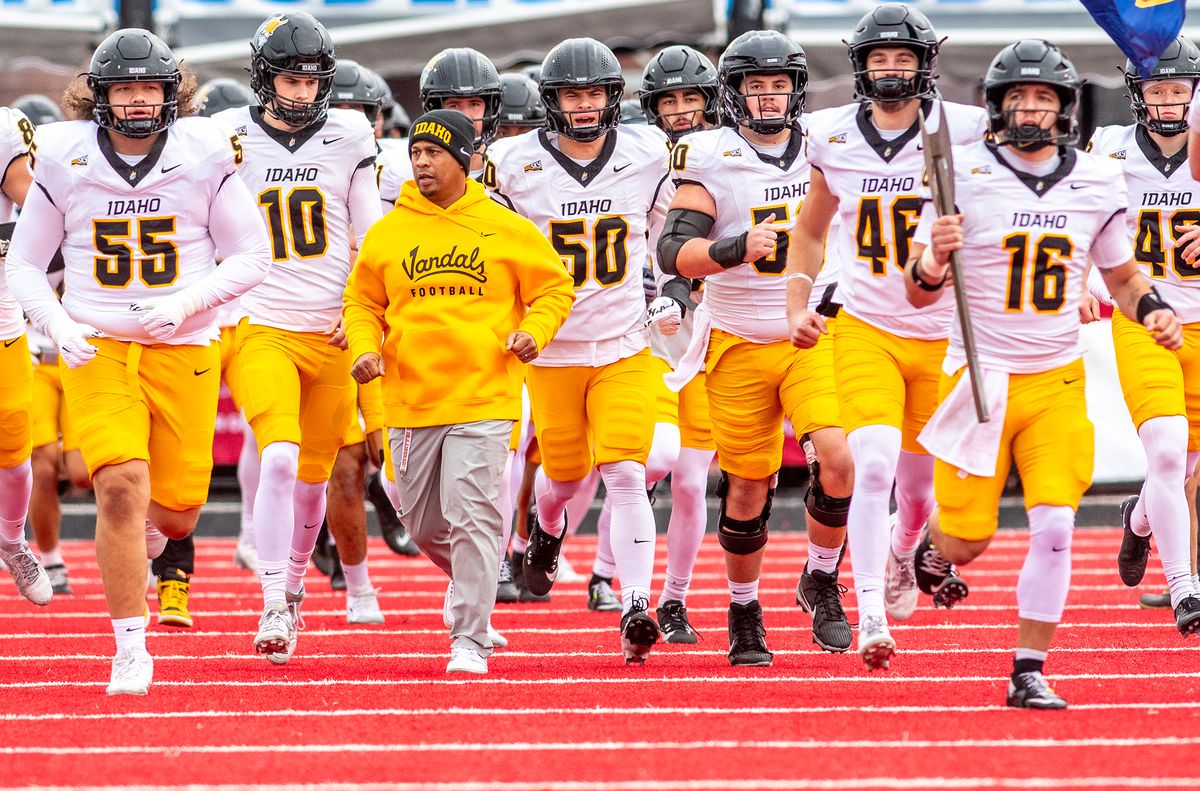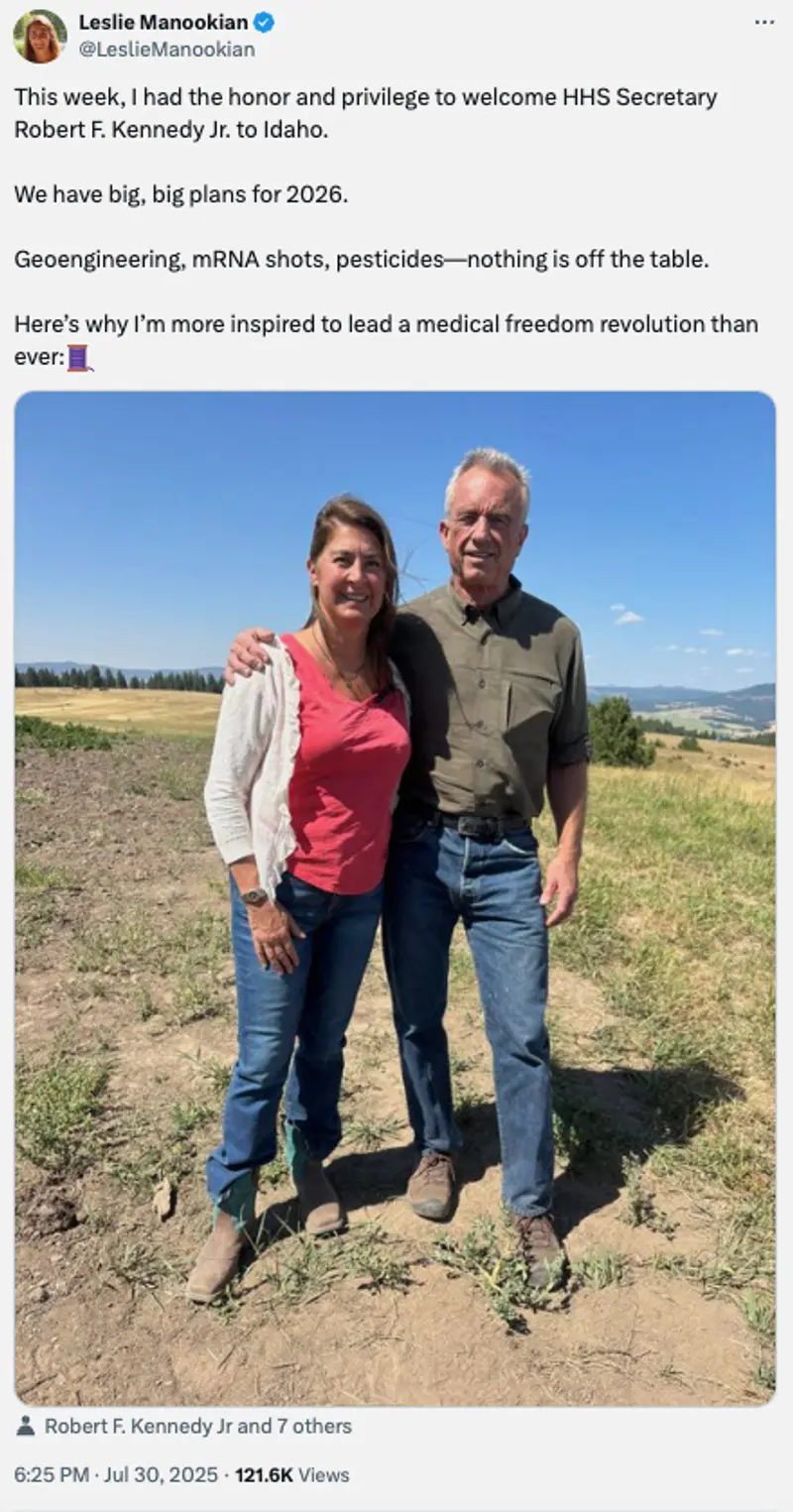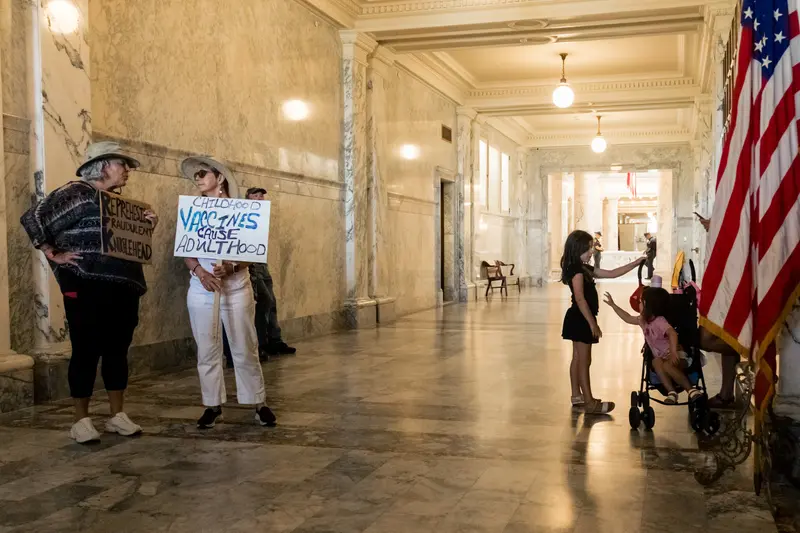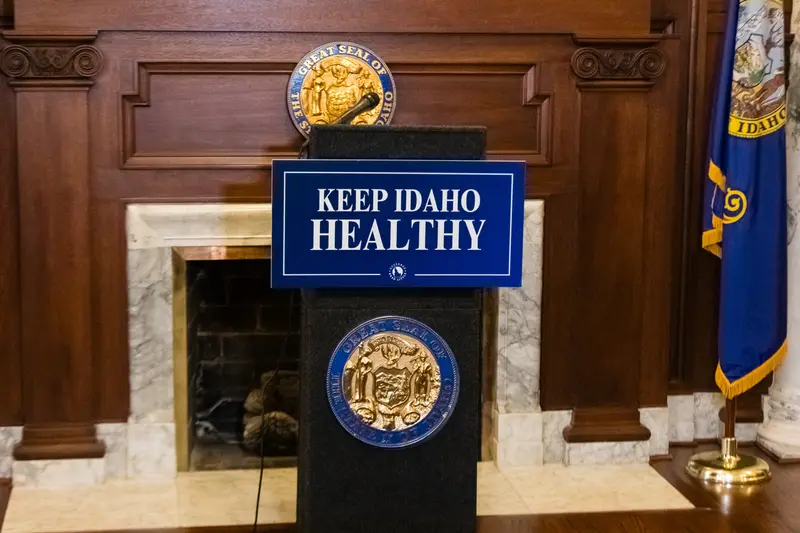ProPublica is a nonprofit newsroom that investigates abuses of power. Sign up for Dispatches, a newsletter that spotlights wrongdoing around the country, to receive our stories in your inbox every week.
Idaho
Idaho high school sports classifications could be changing, adding 6A, and eliminating one 1A division

BOISE, Idaho — The Idaho High School Activities Association voted to advance a proposal that would change High School classifications throughout the state.
Population growth in Idaho also translates into higher enrollment in schools. This proposal is intended to balance the classification and group schools closer together.
Currently, athletic classifications in the state go from 1A to 5A, having two divisions in the 1A class. Under the new proposal, there would still be six classes, but only one 1A class, and a new 6A class.
This would have an impact on which schools compete against each other, and what state titles schools would compete for each year.
If approved in its second reading in August, the new classification would set the bar at 1400 students for the largest classification, 6A. That is an increase from the 1280 benchmark that currently makes up 5A.
“I think increasing the number for that upper level, or the highest classification for the state of Idaho, I think it’s a good thing,” said Andy Ankeny, the Athletic Director at Middleton High School. “I think it helps balance things out a little bit, which I see as a positive.”
Middleton is currently a 5A school in the largest enrollment classification. If the proposal were to pass, it would still be in 5A, though it would be considered the second largest enrollment classification.
Ankeny makes the point that many schools hover around the current classification thresholds. Middleton, itself, has been bumped up from 4A in recent years. He says if the proposal is adopted, there would just be different schools hovering around those barriers.
“Now that the number has changed, we’re going to have some different schools that are potentially always at that number. It just depends on population growth or population decline,” Ankeny said.
Some people don’t think the proposal solves the problems of the current classification system.
Burke Davis, the Principal of Shelley High School, is conflicted about the proposal. He is trying to see its overall impact, but says he thinks the proposal would benefit the largest schools in the state, while not benefiting smaller ones.
“Is it good for the entire state of Idaho?” commented Davis. “Is it good for the 1ADII, 1ADI, 2A, 3A, 4A, 5A? Is it good for the North, the East, the Boise Valley? Because you want it to be overall best picture?”
The proposal will be heard again on August 2. If approved, it would go into effect in the fall of 2024 for the 2024-25 school year.
Here are the documents if you want to review them, including the current classification and proposed classification.

Continue Reading
Idaho
Give Ford, Idaho Vandals grace and time to build the program

However, the subtext with two of those losses is that starting quarterback Joshua Wood has been out with a lower-body injury. In one of the four losses, he played the entire second half with an injury as well.
Ford said that there was no reason to rush Wood back and did not want to risk any further injury for the QB. He said the long-term goal is to have Wood ready for multiple years to come on the Vandals.
Idaho is planning to take an intrinsic look within the program and reassess what might be working and what may not.
“And so obviously, when you’re in a spot where you’ve lost four games in a row, you’ve got to really look inside and see what’s important,” Ford said. “And right now, what’s important is this team’s got to get better. I think you’re really seeing our youth on display in a lot of areas, and we’ve got to coach them better. Starts with me.”
Ford said that the plan is to do a better job at play selection with the talent the team has and try to get back to winning. He said the big focus of the week is “doesn’t matter, get better.”
Obviously there is pressure when you should be a top team in the Big Sky and in the FCS with the success that the Vandals’ have had recently with Eck, but historically, his time with Idaho is an outlier.
I’m not saying that Ford is bound for Paul Petrino type years. Let’s say Idaho sticks around the bottom of the Big Sky for the next couple years, then I think it would be right for the university to move on from him and his coordinators.
Heck, I wouldn’t be surprised for them to move on from one of their coordinators after this year.
But in reality, it takes time to build a successful program. Idaho should give Ford time to build up his recruits, work the transfer portal and continue to build the team up for next year and the years after.
Junt can be reached at 208-848-2258, tjunt@lmtribune.com or on X (formerly Twitter) @TrevorJunt.
Idaho
Idaho Banned Vaccine Mandates. Activists Want to Make It a Model for the Country.

Three women become choked up as they deliver news in a video posted to social media. “We did it, everybody,” says Leslie Manookian, the woman in the middle. She is a driving force in a campaign that has chipped away at the foundations of modern public health in Idaho. The group had just gotten lawmakers to pass what she called the first true “medical freedom” bill in the nation. “It’s literally landmark,” Manookian said. “It is changing everything.”
With Manookian in the video are two of her allies, the leaders of Health Freedom Idaho. It was April 4, hours after the governor signed the Idaho Medical Freedom Act into law.
The act makes it illegal for state and local governments, private businesses, employers, schools and daycares to require anyone to take a vaccine or receive any other “medical intervention.”
Whether the law will actually alter day-to-day life in Idaho is an open question, because Idaho already made it easy to get around the few existing vaccination requirements.
But it could have a significant effect in other states, where rules aren’t already so relaxed. And it comes at a time when diseases once eradicated from the U.S. through vaccination are making a resurgence.
The law runs against one of the hallmarks of modern public health: that a person’s full participation in society depends on their willingness to follow certain rules. (Want to send your child to public school? They’ll need a measles vaccine. Want to work in a retirement community during flu season? You might have to wear a mask.)
The new Idaho law flips that on its head. It not only removes the obligation to follow such rules, it makes the rules themselves illegal.
The new law sets Idaho apart from even conservative-leaning South Carolina, where two schools recently quarantined more than 150 unvaccinated children after measles arrived.
A person can spread measles for four days before symptoms appear. During the South Carolina schools’ quarantine, five students began to show symptoms, but the quarantine kept them from spreading it, the health department said this month.
That precaution would now be illegal in Idaho.
Idaho’s law caught the attention of people who share Manookian’s belief that — contrary to hundreds of years of public health evidence and rigorous regulation in the U.S. — vaccines are worse than the diseases they prevent.
It also caught the attention of people like Jennifer Herricks, a pro-vaccine advocate in Louisiana and advocacy director for American Families for Vaccines.
Herricks and her counterparts in other states say that vaccine requirements have “done so much good for our kids and for our communities.”
An analysis published last year by the U.S. Centers for Disease Control and Prevention found that routine childhood vaccines prevented more than 1.1 million deaths and 32 million hospitalizations in the U.S. over three decades, saving $540 billion in direct costs and saving society about $2.7 trillion. The analysis was limited; it didn’t account for the lives and money saved by vaccines for flu or RSV, which kill and hospitalize babies and children each year.
Idaho’s move was “pretty concerning,” Herricks said, “especially seeing the direction that everything is headed at the federal government.”
The law is the culmination of a decade of anti-vaccine activism that got a boost from the pandemic.
It’s rooted in a belief system that distrusts institutions — government health agencies, vaccine makers, medical societies and others — on the premise that those institutions seek only money and control.
Manookian said in an interview that she believes one person should never be told to risk their health in “the theoretical” service of another.
Now, Manookian and her allies have a new goal in their sights: to make Idaho’s legislation a nationwide standard.
Idaho was already more permissive than other states when it came to vaccine rules. Parents since at least the 1990s could send unvaccinated children to school if they signed a form saying vaccination went against their religious or personal beliefs.
That wasn’t good enough for Idahoans who describe themselves as advocates for health freedom. They worked to shift the paradigm, bit by bit, so that it can be easier now for parents to get a vaccine exemption than to show the school their child is actually vaccinated.
In recent years, lawmakers ordered schools and daycare centers to tell parents about the exemptions allowed in Idaho whenever they communicate about immunizations.
The state also decided to let parents exempt their kids by writing a note, instead of having to fill out a form — one that, in the past, required them to acknowledge the risks of going unvaccinated.
(There is conflicting data on whether these changes truly affected vaccination rates or just led more parents to skip the trouble of handing in vaccine records. Starting in 2021, Idaho schools reported a steady drop in the share of kindergartners with documented vaccinations. Phone surveys of parents, by contrast, showed vaccination rates have been largely unchanged.)
An enduring backlash against Idaho’s short-lived COVID-19 mandates gave Manookian’s movement more momentum, culminating this year in what she considered the ultimate step in Idaho’s evolution.
Manookian had a previous career in finance in New York and London. She transitioned to work as a homeopath and advocate, ultimately returning to her home state of Idaho.
The bill she came up with said that almost nobody can be required to have a vaccine or take any test or medical procedure or treatment in order to go to school, get a job or go about life how they’d like to. In practice, that would mean schools couldn’t send unvaccinated kids home, even during a measles outbreak, and private businesses and daycares couldn’t require people on their property to follow public health guidance.
The state had just passed “the Coronavirus Stop Act” in 2023, which banned nearly all COVID-19 vaccine requirements. If lawmakers did that for COVID-19, Manookian reasoned, they could do the same for all communicable diseases and all medical decisions.
Credit:
Courtesy of Leslie Manookian
Her theory was right, ultimately.
The bill she penned in the summer of 2024 made it through the Republican-controlled House and Senate in early 2025.
Manookian took to social media to rally support for the legislation as it sat on the desk of Gov. Brad Little.
But the governor vetoed it. In a letter, he explained that he saw the bill as government intrusion on “parents’ freedom to ensure their children stay healthy.” During an outbreak, he said, schools wouldn’t be able to send home students “with highly contagious conditions” like measles.
Manookian tried again days after the veto. In the next version of the bill, protections during a disease outbreak applied only to “healthy” people.
This time, Little signed it.
Weeks after the signing, Manookian joined like-minded advocates on a stage in Washington, D.C., for a launch event for the MAHA Institute, a group with strong ties to Robert F. Kennedy Jr. (MAHA stands for Make America Healthy Again.) The new Health and Human Services secretary had denounced vaccines for years before President Donald Trump appointed him.
At the gathering, Manookian announced her next mission: to make it “a societal norm and to codify it in law” that nobody can dictate any other person’s medical choices.
“We’re going to roll that out to other states, and we’re going to make America free again,” Manookian told the audience in May.
Manookian’s commitment to bring along the rest of the country has continued ever since.

Credit:
Screenshot by ProPublica
Her nonprofit, the Health Freedom Defense Fund, is now distributing model legislation and a how-to guide, with talking points to persuade legislators. Manookian said in podcast interviews that she is working with the nonprofit Stand For Health Freedom to mobilize activists in every state.
In an interview with ProPublica, Manookian said her objective is for people to “understand and appreciate that the most basic and fundamental of human rights is the right to direct our own medical treatment — and to codify that in law in every state. Breaking that barrier in Idaho proves that it can be done, that Americans understand the importance of this, and the humanity of it, and that it should be done in other states.”
Her efforts were rewarded over the summer with a visit from none other than Kennedy, who visited Boise and toured a farm with Manookian and state lawmakers in tow.
“This state, more than any other state in the country” aligns with the MAHA campaign, Kennedy told reporters at a news conference where no one was allowed to ask questions. Kennedy called Idaho “the home of medical freedom.”
The Department of Health and Human Services did not respond to ProPublica’s request for comment from Kennedy or his staff on Idaho’s law and his visit to the state.
Children’s Health Defense, the organization Kennedy built into one of the fiercest foes of childhood vaccines, took interest in the Idaho bill early on.
The group promoted the bill as it sat on the governor’s desk, as he vetoed it, then as Manookian worked successfully to get a revived bill through the statehouse and signed into law.
The organization’s online video programming featured Manookian five times in late March and early April. One show’s host told viewers they could follow Idaho in its “very smart strategy” of taking a law against COVID-related mandates, “crossing out ‘COVID,’ making a few other tweaks, and you have an incredible health freedom bill after that.”
Children’s Health Defense CEO Mary Holland said she’s known Manookian for more than 15 years and pushed the national organization to publicize Manookian’s work. Holland introduced her at the Washington, D.C., event.
Whereas most states put the onus on unvaccinated people to show why they should opt out of a mandate, Idaho’s legislation made unvaccinated people the norm — shifting the burden of accommodation onto those who support vaccination.
Now, parents of infants too young for a measles vaccine can’t choose a daycare that requires immunization. Parents of immune-compromised students must decide whether to keep their children home from school during an outbreak of vaccine-preventable diseases, knowing unvaccinated children won’t be quarantined.
Holland said Idaho parents who want their kids to be in a learning environment with “herd immunity” levels of measles vaccination can start a private “association” — not a school, because schools can’t require vaccines — just as parents who don’t like vaccines have done in order to dodge requirements imposed by states like California and New York.
“I think you could certainly do that in Idaho.” Holland said. “It wouldn’t be a public school. It might be the Church of Vaccinia school.”

Credit:
Otto Kitsinger for ProPublica
The day Idaho’s Medical Freedom Act was signed, a legislator in Louisiana brought forward the Louisiana Medical Freedom Act. In a hearing later, she pointed to Idaho as a model.
Louisiana followed Idaho once before in 2024, when it passed a law that requires schools to describe the exemptions available to parents whenever they communicate about immunizations. Idaho had passed an almost identical law three years earlier.
Herricks, the Louisiana pro-vaccine advocate, said she watched the Idaho Medical Freedom Act’s progress with “a lot of concern, seeing how much progress it was making.” Now it’s set a precedent, Herricks said.
Holland, the Children’s Health Defense CEO, said she looks forward to Idaho’s approach spreading.
She pointed to a September announcement by Florida Surgeon General Dr. Joseph Ladapo that he intends to rid his state of all vaccine mandates. Holland said she expects other Republican-controlled states to take a serious look at the Idaho law. (Ladapo’s office did not respond to requests for comment.)
“It’s a big change,” Holland said. “It’s not just related to vaccines. It’s a blow against the notion that there can be compulsory medicine.”
Some people support the more-than-century-old notion that compelling people to be vaccinated or masked will provide such enormous collective benefits that it outweighs any inconvenience or small incursion on personal liberty.
Others, like Holland and Manookian, do not.
At the heart of laws like Idaho’s is a sense of, “‘I’m going to do what I want to do for myself, and I don’t want anybody telling me what to do,’ which is in direct contrast to public health,” said Paul Offit, pediatrician and vaccinologist at the University of Pennsylvania and Children’s Hospital of Philadelphia.
Offit, who co-invented a vaccine against rotavirus, is a critic of Kennedy and was removed from a federal vaccine panel in September.
A more fundamental conflict is that some people believe vaccines and other tools to prevent the spread of illness, like masks, are harmful. That belief is at odds with the overwhelming consensus of scientists and health experts, including Kennedy’s own Department of Health and Human Services and the CDC.
Both tensions are at play in Idaho.

Credit:
Otto Kitsinger for ProPublica
As is the case nationally, Idaho’s “health freedom” movement has long pushed back against being labeled “anti-vaccine.” Idaho lawmakers and advocates have stressed that their goals are bodily autonomy and informed choice.
They do not take a stance on the bodily autonomy principle when it comes to abortion, however. Almost all state legislators who voted for the Idaho Medical Freedom Act also voted to ban abortion, if they were in office at both times.
“Every action has to be evaluated on its individual morality,” not on whether it does the most good for the most people, Manookian said.
But Manookian’s rejection of vaccine mandates goes beyond a libertarian philosophy.
Manookian has said publicly that she thinks vaccines are “poison for profit,” that continuing to let daycares require vaccination would “put our children on the chopping block,” that measles is “positive for the body,” that the virus protects against cancer, and that it can send people “into total remission” — an assertion she made on an Idaho wellness center’s podcast in April.
Manookian told ProPublica she believes infectious diseases have been made “the bogeyman.”
Against those claims, research has shown that having the measles suppresses immunity to other diseases, a phenomenon dubbed “immune amnesia” that can make children who have recovered from measles more susceptible to pneumonia and other bacterial and viral infections. About 20% of unvaccinated people who get measles will be hospitalized, and 1 to 3 of every 1,000 children who are infected will die from complications of the disease, according to the CDC.
And while researchers have studied using engineered measles viruses in a cancer treatment, those same researchers have written that they were “dismayed to learn” their research has been misconstrued by some who oppose vaccination. They said they “very strongly advise” giving children the measles vaccine, that there “is no evidence that measles infection can protect against cancer” and that measles is “a dangerous pathogen, not suitable for use as a cancer therapy.”
(Manookian said she believes she has evidence for her cancer remission claim but couldn’t readily produce it, adding that she may have been mistaken.)
The measles-mumps-rubella vaccine, meanwhile, is safe and highly effective, according to the American Academy of Pediatrics, the Infectious Diseases Society of America and the U.S. Centers for Disease Control and Prevention, among others. The CDC says the most common negative reactions are a sore arm, fever or mild rash. Two doses of the vaccine provide near total protection, according to the CDC.
Manookian said she doesn’t believe the research on vaccines has been adequate.
She will have another chance to spread her views from a prominent platform in November, when she’s scheduled to speak at the Children’s Health Defense 2025 conference in Austin, Texas.
She’ll share the stage with celebrities in the anti-vaccine movement: Del Bigtree, communications director for Kennedy’s past presidential campaign; actor Russell Brand; Kentucky Sen. Rand Paul and Wisconsin Sen. Ron Johnson; and Ladapo, the Florida surgeon general who made headlines for his push to end vaccine mandates in Florida, months after Idaho wrote that concept into law.
Idaho
HAPPENING NOW: Large law enforcement investigation at Wilder racetrack

CANYON COUNTY, Idaho — Law enforcement officers are on scene at a horse racetrack on Peckham Road in Wilder.
Neighborhood Reporter Brady Caskey is at the racetrack. Caskey si reporting that the DEA, Canyon County Sheriff’s Office, SWAT, and the Canyon County Sheriff’s Office Crime Lab are present.
Videos show officials in military gear with German Shepherds and rifles asking the crowd of people to stand back. Dozens of people seem to be trying to talk with the officials.
A video from a viewer also shows a helicopter in the sky.
Idaho News 6
Lawyers and attorneys with ACLU say they are headed to the location, as well as Poder of Idaho. A spokesperson with ACLU says they were told the law enforcement officials on scene were using rubber bullets.
WATCH: Law enforcement officials from various local, state, and federal agencies in Wilder
Large law enforcement presence at racetrack in Wilder
Idaho News 6 will continue to cover this story as more information becomes available.
-

 World16 hours ago
World16 hours agoIsrael continues deadly Gaza truce breaches as US seeks to strengthen deal
-

 Alaska7 days ago
Alaska7 days agoMore than 1,400 seeking shelter as hundreds wait to be evacuated after catastrophic Western Alaska storm, officials say
-

 News17 hours ago
News17 hours agoTrump news at a glance: president can send national guard to Portland, for now
-

 Business15 hours ago
Business15 hours agoUnionized baristas want Olympics to drop Starbucks as its ‘official coffee partner’
-

 North Carolina1 week ago
North Carolina1 week agoGuide to NC State Fair 2025: Tickets, transportation, parking, new rides and special event days
-

 Politics14 hours ago
Politics14 hours agoTrump admin on pace to shatter deportation record by end of first year: ‘Just the beginning’
-
Science16 hours ago
Peanut allergies in children drop following advice to feed the allergen to babies, study finds
-

 World1 week ago
World1 week agoAlbanian judge killed in courtroom shooting amid growing anger over justice system reforms






















